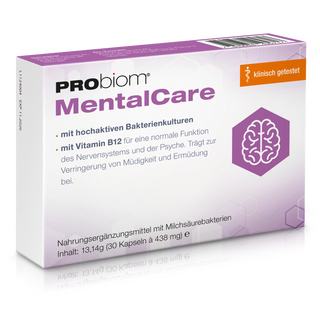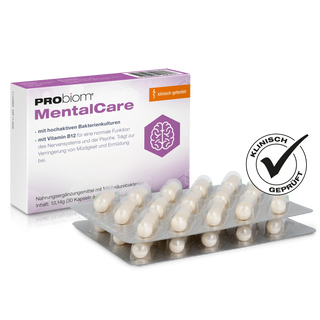Amoxicillin is a commonly used antibiotic. It helps fight bacterial infections in the body – whether for tonsillitis, bronchitis, or after dental surgery. But what many people don't know is that amoxicillin not only works against "bad" bacteria, but also affects the "good" bacteria in the gut – the so-called microbiome .
Our gut is populated by trillions of microorganisms that support our digestion, immune defenses, and even our mood. When this balance is disrupted, it can have noticeable consequences—from bloating to a weakened immune system.
Why antibiotics attack the microbiome
Antibiotics like amoxicillin aren't particularly picky. They kill bacteria—regardless of whether they make us sick or are actually beneficial. This leads to the following in the intestines:
-
helpful bacteria disappear
-
pathogenic germs can spread
-
the balance is out of whack
The result: Our gut becomes imbalanced, also known as dysbiosis . Symptoms range from minor gastrointestinal issues to long-term health consequences.
How exactly does the intestine change?
During the first few days of antibiotic therapy, the diversity of the microbiome shrinks significantly. Our gut normally consists of hundreds of different bacterial species. After a course of antibiotics, sometimes only a few species remain—a kind of "desert landscape" in the gut.
Particularly affected are:
-
Butyric acid producers (e.g. Faecalibacterium prausnitzii ): These help to keep our intestinal mucosa healthy.
-
Lactobacilli and bifidobacteria : Important for digestion and the immune system.
Also problematic is:
-
Harmful bacteria such as E. coli or Klebsiella can now multiply more easily.
-
Fungi (e.g. Candida or mold) also find better conditions in this environment.
What does this mean for your health?
Many people notice after antibiotic treatment that their gut "no longer functions as it did before." Common symptoms include:
-
Bloating, feeling of fullness or constipation
-
Diarrhea (often even while taking the medication)
-
Fatigue, lack of motivation
-
More frequent illness (weakened immune system)
-
Food intolerances
This is because the microbiome does much more than just help with digestion:
-
It protects us from pathogens
-
It supports our immune system
-
It produces vitamins and important fatty acids
-
It influences our mood (via the gut-brain axis)
If this system is disrupted, it can have far-reaching consequences – not only in the intestines.
How long does it take for the intestines to recover?
This varies greatly. For some people, the microbiome is largely stable again after a few weeks . For others, it takes months for the original balance to return – or it never fully returns.
What influences recovery:
-
How long the antibiotic was taken
-
Whether it is a broad-spectrum antibiotic (such as amoxicillin)
-
How healthy the microbiome was before
-
Diet and lifestyle during and after treatment
Overview: How Amoxicillin Changes the Intestine
| Area | Short-term (days – 1 week) | Medium term (weeks – months) | Possible long-term consequences |
|---|---|---|---|
| intestinal flora | strong reduction in bacterial diversity | slow reconstruction | permanent changes possible |
| Beneficial bacteria | greatly reduced | recover slowly | some disappear permanently |
| Harmful germs | gain the upper hand | can settle | Risk of infections or fungi |
| digestion | Flatulence, diarrhea, constipation | Improvement over time | impaired food utilization possible |
| immune system | weakened | recovers with good build-up | long-term immune problems in children |
| Mood & Energy | Feeling of being “out of step” | slowly normalizes | possibly persistent exhaustion |
| Resistances | resistant bacteria survive | resistant intestine possible | increased risk of superinfections |
Typical experiences – real voices
Many people share their experiences after taking antibiotics online. Here are a few quotes:
"After 7 days of amoxicillin, my stomach was completely messed up—I had bloating and constipation for three weeks. It only got better with yogurt and lots of vegetables."
“I felt weak, had constant cravings for sugar, and couldn’t really get going.”
"With probiotics, I felt better faster after treatment – I should have started taking them right away."
What can you do about the side effects?
The good news: You can help your gut recover faster.
1. Eat fiber
Fiber is "food" for good gut bacteria. It helps them multiply and restore balance. Good sources include:
-
Whole grain products
-
Legumes
-
Fruit (e.g. apples, berries)
-
Vegetables (e.g. broccoli, carrots)
2. Fermented foods
They contain live microorganisms that can directly strengthen your microbiome:
-
Yogurt (with live cultures)
-
kefir
-
Sauerkraut (raw, not heated!)
-
Kimchi
3. Probiotics – yes or no?
Studies show that probiotics can help restore balance faster—especially when taken at the same time as the antibiotic. The following are particularly well-researched:
-
Lactobacillus rhamnosus
-
Saccharomyces boulardii
Important: Not every product works equally well – quality is crucial.
4. Drink plenty and reduce stress
Water helps flush out toxins. And less stress supports the immune system and the gut. Because the gut and brain are connected via nerves and hormones.
Especially important for children
Antibiotic treatment can have a particularly significant impact on babies and young children because their microbiome is still developing. Studies show that children who receive a lot of antibiotics early on are at higher risk for:
-
Allergies
-
asthma
-
Obesity
-
intestinal diseases
Therefore, antibiotics should only be used in children with a clear medical indication and for as short a time as possible.
Beware of common mistakes
-
Not dairy products at the same time? Amoxicillin is not sensitive to milk, so it can be combined with yogurt or kefir—in fact, it's beneficial for the gut.
-
Clavulanic acid makes it worse: Combination medications like amoxicillin/clavulanic acid are even more stressful for the intestines. If possible, you should avoid them—talk to your doctor.
-
Antibiotics only when absolutely necessary! Many infections—such as colds or flu—are caused by viruses and do not require antibiotics .
Conclusion: Be careful with antibiotics – and help your gut
Amoxicillin can have an important and life-saving effect. At the same time, it severely interferes with our delicate microbiome. The consequences range from temporary digestive problems to potential long-term effects.
Therefore, only take antibiotics when they are really necessary!


















